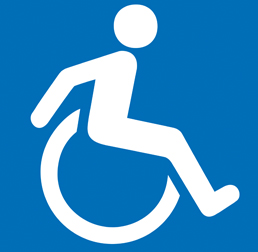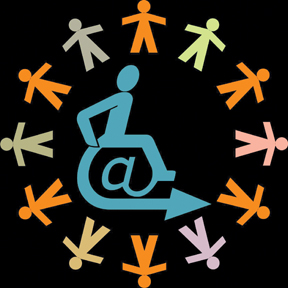|
International Day of Persons with Disabilities fell
on December 3:
Empowering the differently abled
by Pramod DE SILVA
Imagine not having one of your faculties (hearing, eyesight, hands or
legs, speech etc) and trying to cope up in a world primarily designed
for the able bodied. Life is a daily struggle for the millions of people
the world over who are either born with a disability or acquire one
later due to injury, accident or disease.
 They do face many hurdles in a 'normal' world. But they should not
get the feeling that they are alone. They deserve equality and access,
not necessarily sympathy. The world has come far in accommodating the
wishes and demands of persons with disabilities, although Sri Lanka is
still lagging behind in certain aspects. We need to focus on social
integration of the disabled, now mostly called the differently abled. They do face many hurdles in a 'normal' world. But they should not
get the feeling that they are alone. They deserve equality and access,
not necessarily sympathy. The world has come far in accommodating the
wishes and demands of persons with disabilities, although Sri Lanka is
still lagging behind in certain aspects. We need to focus on social
integration of the disabled, now mostly called the differently abled.
There are an estimated 700 million persons with disabilities
worldwide, or 10 per cent of the global population. Approximately two
thirds live in developing countries. In certain developing countries
nearly 20 per cent of the general population in some way has a
disability; if the impact on their families is taken into account, 50
per cent of the population is affected.
The annual observance of the International Day of Persons with
Disabilities on December 3, (just one week before the Human Rights Day)
aims to promote an understanding of disability issues, the rights of
persons with disabilities and gains to be derived from the integration
of persons with disabilities in every aspect of the political, social,
economic and cultural life of their communities. This year's theme of
the International Day of Persons with Disabilities is "Empowering
Persons with Disabilities with the Right to Act." Empowering the
disabled is a prime need.
The Day provides an opportunity to mobilize action to achieve the
goal of full and equal enjoyment of human rights and participation in
society by persons with disabilities, established by the World Programme
of Action concerning Disabled Persons, adopted by the United Nations
General Assembly in 1982.
In 1992, the United Nations proclaimed December 3 of each year as
International Day of Disabled Persons with the aim of promoting a better
understanding about disability issues and increasing awareness of gains
to be derived from the integration of persons with disabilities in every
aspect of political, social, economic and cultural life.
On 13 December 2006, the General Assembly adopted the Convention on
the Rights of Persons with Disabilities, the first major human rights
instrument of the 21st century. Since entering into force in 2008, 75
countries have ratified the convention.
According to the UN, many persons with disabilities continue to face
barriers to their participation in their communities and are often
forced to live on the margins of society. They often face stigma and
discrimination and are routinely denied basic rights such as food,
education, employment, access to health and reproductive health
services. Many persons with disabilities are also forced into
institutions, a direct breach of the rights to freedom of movement and
to live in their communities. Although many commitments have been made
to include disability and persons with disabilities in development, the
gap between policy and practice continues.
 One of the main planks of the UN's campaign against discrimination of
the disabled is that 'Disability Resides in the Society not in the
Person'. For example, a person in a wheelchair might have difficulties
being gainfully employed not because of one's condition but because
there are environmental barriers such as inaccessible buses or
staircases in the workplace which obstruct his or her access. One of the main planks of the UN's campaign against discrimination of
the disabled is that 'Disability Resides in the Society not in the
Person'. For example, a person in a wheelchair might have difficulties
being gainfully employed not because of one's condition but because
there are environmental barriers such as inaccessible buses or
staircases in the workplace which obstruct his or her access.
This is a huge issue in developing countries such as Sri Lanka which
do not have the necessary infrastructure for the disabled. It is
heartening to note that all new buildings are now required by law to
have access and other facilities for the disabled (restrooms, tactile
aids etc) but where possible, action should be taken to retrofit such
facilities in existing buildings and structures. We are miles behind in
disabled-friendly legislation and actions but it is not too late to
catch up.
Access is a key issue and not only in a strictly physical sense such
as entering a building. The disabled should receive equal access to
education, health and other services as well. Many 'normal' schools are
reluctant to admit mentally or physically challenged students and the
entire society is under the impression that these children only belong
in a 'special' institution. Yet there are many success stories of
disabled, especially visually and aurally impaired students doing well
in normal schools.
Equal access to employment is another issue. There certainly are jobs
which require persons without any disability. On the other hand, there
are many jobs that disabled persons can do, depending on their
disability. But there is widespread discrimination against such persons.
Another example for the broad definition of 'access' would be simple
things that make life easier for the disabled. Currency notes with
tactile features that highlight the amount for the benefit of the
visually impaired is one such example.
Another is a traffic signal system that gives auditory cues for
visually impaired pedestrians. More TV programmes should feature sign
language interpretation and same-language subtitles for the deaf and
hard of hearing. Pubic transport systems such as trains and buses must
be designed to facilitate travelling by disabled persons.
Most of these have already been implemented in many countries,
including some developing ones. Some of these measures are not very
costly either.
Persons with disabilities are part and parcel of our society.
A perfectly able person today can become disabled tomorrow. Society
must treat persons with disabilities on an equal footing and empower
them to act to win their just rights. That is the message that the world
must hear on December 3 and afterwards. |

